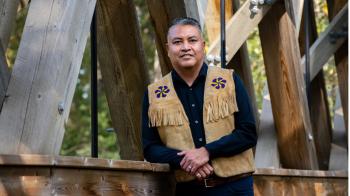Image Caption
Summary
Local Journalism Initiative Reporter
Windspeaker.com
Decisions by the cities of Prince George and Vancouver to not fight rulings handed down by British Columbia courts against dismantling tent cities may be an indication of a change of attitude toward the homeless.
In January, the Supreme Court of British Columbia found the Vancouver Park Board was not justified in issuing eviction orders the previous summer to force homeless people out of the CRAB Park encampment. Vancouver did not appeal the decision.
Vancouver’s decision may have influenced Prince George in northern BC, says Melanie Begalka, legal counsel with the British Columbia First Nations Justice Centre (BCFNJC), who admits she was as surprised as everyone else last week when Prince George withdrew its appeal in a fight against an encampment on city park land locally known as Moccasin Flats.
Begalka is co-counsel for Sheldon Stewart, Crystal Arndt, Brandon Deeg, Jane Doe, John Doe, and other unnamed people occupying the encampments. She undertook legal action on their behalf against Prince George when the city decided to evict people living in two separate encampments.
Prince George lost its legal battle for an eviction order for the Moccasin Flats (Lower Patricia) encampment in an October 2021 court ruling and then again in a Feb. 23 decision.
The October ruling by Supreme Court of BC Chief Justice Christopher Hinkson did allow for the city to tear down the George Street camp because the majority of those occupants had relocated to Moccasin Flats.
In that decision, Hinkson wrote, “While the city contends that the availability of 81 shelter beds in the city is sufficient to house the encampment occupants, I am not satisfied that these shelter spaces are in fact accessible to all of the occupants of the encampments.”
However, despite that October ruling, Prince George removed the shelter structures at Moccasin Flats.
On Feb. 23, Justice Simon Coval upheld the earlier decision and ruled that the city had “inflicted serious harm on vulnerable people” by taking that action.
In a statement issued March 24, the city apologized “to all those who experienced trauma” when Moccasin Flats was dismantled and announced it would not appeal Coval’s decision.
“What I hope, and what’s great about that decision, is that it kind of signals a change in approach is required by municipalities,” said Begalka.
She says every year she hears about one or two cases that make it to court with municipalities trying to shut down homeless encampments.
If Prince George had gone ahead with its appeal, the Court of Appeal had scheduled a special sitting in that city, which is an unusual move, says Begalka.
“So that’s an indication by the court that they …considered this to be of special significance to the public,” she said.
As did BC’s Attorney General, which applied for intervener status to argue, in part “…that the chambers judge held that homeless persons ‘must be permitted’ to remain in unlawful encampments ‘absent other suitable housing and daytime facilities’,” reads the memorandum of argument the Attorney General filed on Feb. 22.
It was also noted that this “could potentially be interpreted as imposing significant new obligations on the government, as well as local governments.”
These recent court decisions, says Begalka, tell municipalities that “there’s better ways of dealing with (homelessness). In the past a lot of these decisions have been a rubber stamp by courts for the city, and I think we’ve seen in the last six months that courts are unwilling to continue doing that because the harm to the people who are homeless is significant. I’m hoping that cities are going to reconsider this litigation approach in the future.”
The British Columbia Assembly of First Nations also had intervener status in the appeal.
In its memorandum of argument, the BCAFN stated that the “rule of law and the public interest in reconciliation are not served by displacing a largely Indigenous homeless population, with nowhere to go, from public lands.”
Figures collected from the 2021 Point-in-Time homeless assessment in Prince George indicated that 70 per cent of those people facing ‘absolute homelessness’ are Indigenous. The city’s total Indigenous population is between 10 to 15 per cent.
“(Hinkson) understood that the issue was more complex than certainly giving out fines to deter from being homeless. But how do you deter from being homeless? It’s not like some of the people that are homeless down there don’t want homes, but there’s underlying issues. I think the judge there understood that,” said BCAFN Regional Chief Terry Teegee.
As for Prince George’s apology, “it’s as sincere as how much they’re going to do something about that,” said Teegee, who resides in that city.
He points to the city’s safe streets bylaw which came into force Aug. 30, 2021. Teegee says he met with city council in a closed session to express his concerns with the bylaw, which moves homeless people on from one point to the next without providing help or services.
Teegee says if the city is serious about addressing the issue, it can look at “rescinding or at the very least amending the bylaw.”
In its apology statement, the city said it would “continue to work with agencies who have expertise and resources in this area to address the complex needs of our vulnerable citizens.”
“We can say sorry as much as we want but that doesn’t change the fact they’re still out there using that (safe streets bylaw) tool. I think actions speak louder than the apology,” said Teegee.
Local Journalism Initiative Reporters are supported by a financial contribution made by the Government of Canada.

